Student file of Robert DePoe, a member of the Siletz Nation, who entered the school on August 6, 1893, graduated in 1897, and ultimately departed on June 28, 1900. The student did not attend the school continuously, but left and reentered. The file contains student information cards, a trade/position record card, correspondence, a returned…
Whitwell, John
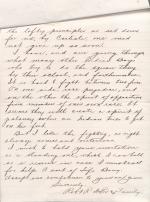
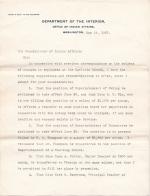
Correspondence regarding changes in employees at the Carlisle Indian School related to disagreements in the philosophies of William A. Mercer and Richard Henry Pratt.
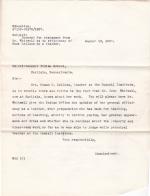
Correspondence regarding the teaching ability of Susan Lelless and her transfer from the Haskell Institute. John Whitewell, current Principal Teacher at the Carlisle Indian School, details his oversight of Lelless including her inability to administer corporal punishment.
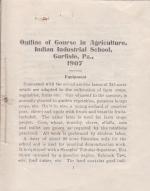
Carlisle Indian School Principal Teacher John Whitwell forwards a pamphlet that provides an overview of a new agriculture class to Superintendent William A. Mercer. Mercer forwards it to Acting Commissioner of Indian Affairs C. F. Larrabee, who tentatively approves the course. The pamphlet, "Outline of Course in Agriculture, Indian Industrial…
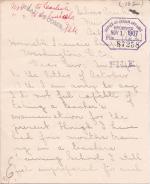
These materials include correspondence regarding a recommendation of Florence Silverheels for a vacant teacher position at Carlisle. Silverheels, a graduate from the Hampton Institute, was recommended by Cora M. Folsom. Silverheels did not take the certification exam for teaching, and instead was appointed as Assistant Matron at the Tongue…
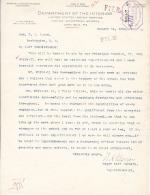
Carlisle Indian School Superintendent William A. Mercer writes Commissioner of Indian Affairs Francis Leupp to endorse Principal Teacher John Whitwell as his successor as Superintendent.
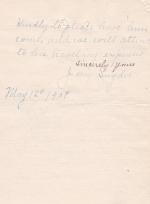
These materials include correspondence regarding the return home of Richmond Martin to New York. The documents also discuss in detail new Bureau of Indian Affairs policies related to the discontinued enrollment of pupils from New York State as well as pupils of a young age.
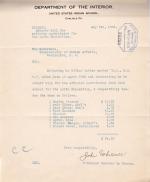
These materials include correspondence regarding student-produced artwork and articles sent for an exhibition in Quito, Ecuador. Products from Carlisle were provided for the exhibit; the correspondence discusses what items were provided as well as the production and retail prices for the articles.
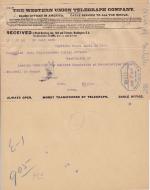
These materials include a telegram from Carlisle Superintendent Moses Friedman informing the Bureau of Indian Affairs that he was leaving for a trip to the Walters Sanitarium in Wernersville, Pennsylvania. John Whitwell was left in charge of the school in Friedman's absence.
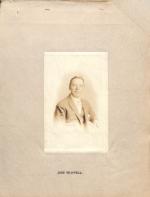
The personnel folder compiled by Washington, DC staff of the Office of Indian Affairs as related to John Whitwell's employment in the Indian Service. At Carlisle Whitwell worked as the principal teacher at Carlisle from 1907-1914.
The folder has been split into four PDFs. "PDF One" covers a range of correspondence and reports…
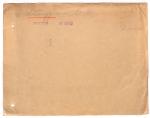
This folder includes documents related to Stauffer's time working at Carlisle as the school musical director or band leader. Two thirds of the material relate to how Stauffer left the school. Having been suspended after the 1914 investigation into the school, Stauffer was not formally fired, but his job position was abolished. The other third…
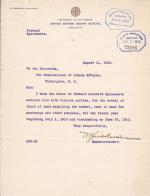
Carlisle Indian School Superintendent Moses Friedman forwards Agreements covering the rental of the Henderson tract of land adjoining the school for fiscal year 1911. Chief of the Education Division J. H. Dortch returns the contract and four copies and asks Friedman to sign it. Friedman returns the corrected and signed documents to the…
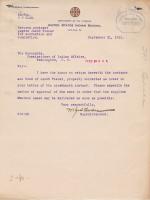
John Whitwell, Principal Teacher in Charge, acknowledges receipt of a contract between Carlisle Indian School Superintendent Moses Friedman and Reid, Murdoch & Co. for dried fruit and mails a copy of an advertisement to the company.
Second Assistant Commissioner of Indian Affairs C. F. Hauke tells Friedman that they have to…
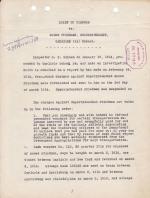
These materials include legal documents and correspondence regarding charges filed against Superintendent Moses Friedman after an inspection and investigation of the Carlisle Indian School. Included in the documents are the official charges against Friedman, his answers to those charges, correspondence regarding the charges, and the…
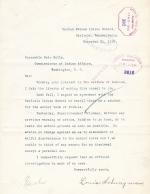
These materials contain correspondence regarding the return of Louis Schweigman to his home. Schweigman complained that he was returned to his home without warning. Superintendent Moses Friedman denied the claim, and noted Schweigman's temporary enrollment status. Friedman also complained to the Commissioner of Indian Affairs the Principal…
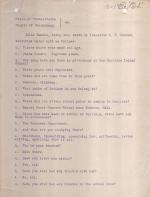
In this affidavit, Julia Hardin answers questions from Indian Inspector Linnen about an incident where she was beaten by the music teacher at the school Claude Stauffer. She explains that the conflict started when she signed-up to go on outing but was expected to leave before she had her belongings prepared.
In Inspector Linnen's main…
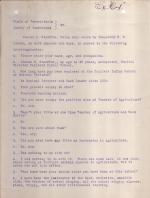
In this affidavit Claude Stauffer answers questions about whether he has any agricultural training, a 1913 incident wherein he beat a student, and the practice of having musical accompaniment for lowering the flag. After the affidavit itself is a document signed by the stenographer who took down the conversation, Beatrice Herman.
In…
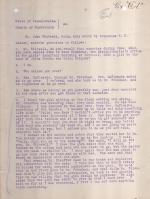
Principal teacher at Carlisle John Whitwell recounts his perspective on an incident of corporal punishment at the school.
In Inspector Linnen's main report for the 1914 Congressional investigation at Carlisle, this document is labelled Exhibit E-1.
Note: This content contains information about an incident of corporal…
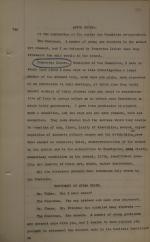
The typed transcript of Hiram Chase's testimony before the Joint Commission to Investigate Indian Affairs. At the time Chase was a student at Carlisle.
In his testimony Chase critiques Superintendent Friedman's arbitrary expulsion of students. He also answers questions regarding student acts of insubordination and alcohol consumption at…
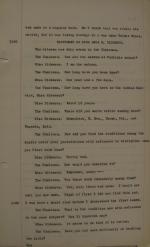
The typed transcript of Anna H. Ridenour's testimony before the Joint Commission to Investigate Indian Affairs. At the time Ridenour was the matron at Carlisle.
In her testimony Ridenour explains her perspective on the use of corporal punishment on Julia Hardin and answers questions about the friction between herself and the students in…
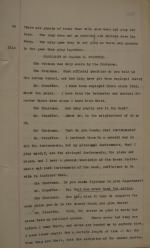
The typed transcript of Claude M. Stauffer's testimony before the Joint Commission to Investigate Indian Affairs. At the time Stauffer was employed as band director at Carlisle.
In his testimony Stauffer answers questions about his proficiency in agriculture and an incident of corporal punishment in which he was involved.
In the…
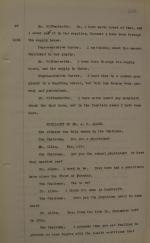
The typed transcript of Dr. A. R. Allen's testimony before the Joint Commission to Investigate Indian Affairs. At the time Allen had just been replaced as the school physician, having worked at the school from 1910 to the end of 1913.
In his testimony Allen recounts the hospital facilities, common health problems, and his efforts to…
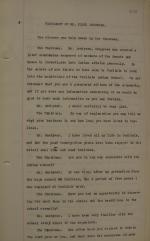
The typed transcript of Fisk Goodyear's testimony before the Joint Commission to Investigate Indian Affairs. (His name is spelled Fiske Goodyear in this transcript.) At the time Goodyear was working at a local coal and lime business, but had previously worked at Carlisle as storekeeper and clerk in the 1890's.
In his testimony Goodyear…
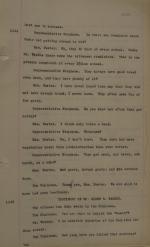
The typed transcript of Glenn S. Warner's testimony before the Joint Committee to Investigate Indian Affairs. At the time Warner was working as the athletic director at the school.
In his testimony Warner answers questions about the formation and financial dealings of the Carlisle Athletic Association. He also discusses an incident of…
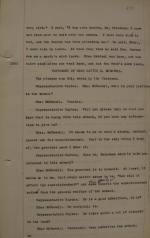
The typed transcript of Hattie M. McDowell's testimony before the Joint Commission to Investigate Indian Affairs. At the time McDowell was a teacher at Carlisle.
In her testimony McDowell explains why she thinks Superintendent Friedman is ill-suited to administer the school.
In the published version of this testimony McDowell's…
